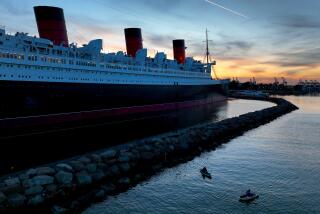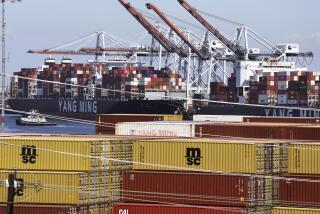Miss the Boat? What If There Is No Boat?
- Share via
Wanna gamble? Never mind Las Vegas. The way things have been going, you can just book yourself onto a maiden cruise aboard a big new ship, then settle down to wait for awkward announcements from the shipyard.
European shipyards, faced with ever larger and more complex orders from across the Atlantic, are running behind deadlines in their production of vessels for American cruise companies. As a result, those cruise companies--including Disney, now facing a big embarrassment on its first foray into the business--find themselves announcing cancellations and delays, confusing and enraging thousands of reservations-holding passengers.
The Rotterdam VI, a new 1,316-passenger ship for Holland America line (a subsidiary of Carnival Corp.), has been twice delayed, missing three scheduled departures. Its first sailing, once slated for Oct. 6, was delayed first to Oct. 30, and then to Nov. 11. Passengers with reservations on the canceled sailings (about 3,000 people) were offered full refunds and 25% discounts on a future cruise.
Then in late October, apologetic Disney Cruise Line (a division of Walt Disney Co.) announced that the Disney Magic’s maiden voyage would be knocked back from March 12 to April 30--a move that wiped out 15 sailings (three or four days each) and changed the plans of an estimated 15,000 to 20,000 customers who already held reservations. Like Holland America, Disney extended a cancellation/discount re-booking offer.
Both ships are being built at Fincantieri shipyards near Venice, Italy. Fincantieri, which also runs shipyards near Trieste, has eight cruise vessels to deliver in 1997, 1998 and 1999. One of those still in the works is Disney’s second ship, the Disney Wonder, still scheduled for launch in December 1998. Among the others are Princess Cruises’ Grand Princess--said to be the world’s largest cruise ship at its scheduled May 14 debut at Southhampton, England--and Sea Princess, to debut Oct. 31, 1998.
Disney and Princess officials say they remain confident of those debut dates. But the new delays do raise a question: Is the excitement of an inaugural cruise worth the trouble? And will this problem continue as the industry rolls out the 27 more ships scheduled to debut by 2000?
“This inaugural thing has always been kind of iffy,” says Don Lansky, senior vice president of The Cruise Line, a major cruise retailer based in Miami. With 10 big ships due to join the North American cruise market in 1998 and just a handful of European shipyards doing all the work, says Lansky, “it seems like the demands are just straining production.”
And an on-time inaugural cruise doesn’t necessarily mean a ship will cruise happily ever after. The Royal Caribbean Cruise Line’s Rhapsody of the Seas, a spokesman recalls, was delivered as planned on April 22 by its French shipyard, Chantiers de l’Atlantique, and made its inaugural cruise May 19. But persistent troubles with a 150-ton motor--which had faltered before the inaugural and caused cancellation of several promotional events in New York--recurred during the ship’s summer cruise schedule in Alaska. Finally, Royal Caribbean canceled two Hawaiian cruises in September, about five months after the ship’s debut, so that it could be dry-docked in Portland, Ore., and fitted with a replacement motor. The Rhapsody of the Seas returned to scheduled service Oct. 5. A spokesman reports no trouble since then.
Mike Driscoll, editor of Cruise Week, an industry newsletter, agrees that “there are bound to be some delays” with so many ships rolling out. The key question, he adds, is how far in advance the affected lines are able to give their customers warning. He praised Disney for making its announcement nearly five months before the original inaugural date.
Industry veterans note that most customers who sign up for inaugural voyages are seasoned cruisers who recognize the risk but want the notch in their belt. But in the case of Disney, a new line that is counting heavily on consumers who haven’t cruised before, many passengers may be learning a hard lesson now. To avoid delivery anxiety and the bugs of a “shakedown” cruise, say many cruise veterans, it generally makes sense to make reservations for two to six weeks after a ship’s scheduled inaugural sailing.
If you’re a travel agent, “it is prudent to warn clients that while there is a wonderful excitement and cachet to a maiden voyage, there also is a certain risk,” says Carnival Cruises spokeswoman Jennifer de la Cruz. “You have to bear that in mind.”
Indeed, notes agent Diane Sehler of Seaside Travel in Long Beach, “maiden voyages usually have a few things to iron out.” She recalled a recent customer who insisted on a maiden cruise, then suffered through so many first-cruise snafus, from unfinished detail-work to poor sound insulation, that the cruise line finally offered the client a second cruise for free, to make good.
“It’s like a soft opening of a hotel [when friends and families of employees stay at little or no cost]--except [cruise lines] charge full price,” Sehler said. “We as a rule do not push maiden voyages.”
It’s impossible to predict shipyard productivity, and it’s worth noting that as the U.S. cruise industry has expanded in recent years, plenty of inaugural cruises have come off on the scheduled dates. Princess spokeswoman Jill Biggins notes that the Fincantieri shipyards have delivered four ships on time to her company since 1990. Before the Rotterdam VI delay, noted spokesman Larry Dessler of Holland America, Fincantieri had met four major Holland America ship delivery deadlines in the last three years.
Reynolds travels anonymously at the newspaper’s expense, accepting no special discounts or subsidized trips. He welcomes comments and suggestions, but cannot respond individually to letters and calls. Write Travel Insider, Los Angeles Times, Times Mirror Square, Los Angeles 90053 or e-mail chris.reynolds@latimes.com.
More to Read
Sign up for The Wild
We’ll help you find the best places to hike, bike and run, as well as the perfect silent spots for meditation and yoga.
You may occasionally receive promotional content from the Los Angeles Times.







